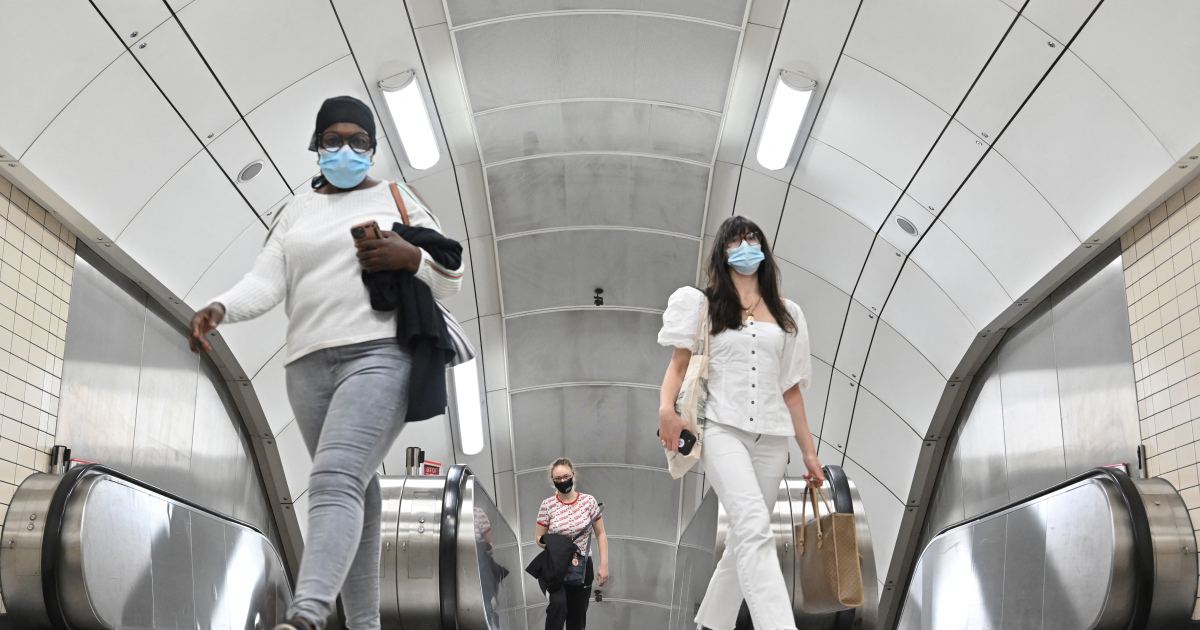The British government has lifted all pandemic restrictions in England – including rules on mask wearing and social distancing – despite scientists’ warnings that the move will further drive an already surging pandemic and risk creating new variants.
The curbs were lifted at midnight (23:00 GMT) on Sunday as laws mandating face masks and working form home were scrapped. The lifting of the rules means nightclubs were also able to reopen for the first time since the UK first went into lockdown in March last year. Other indoor venues such as theatres and cinemas will also be able to operate at full capacity.
Prime Minister Boris Johnson, who is in isolation after health minister Sajid Javid tested positive for COVID-19, urged people to remain cautious. His government is hoping that the UK’s rollout of coronavirus vaccines will help protect the country even as infections surge to levels last seen in January.
“If we don’t do it now we’ve got to ask ourselves, when will we ever do it?” Johnson said in a video message filmed on Sunday.
“This is the right moment but we’ve got to do it cautiously. We’ve got to remember that this virus is sadly still out there.”
If the vaccines continue to prove effective in reducing severe illness and deaths even with infections at record levels, Johnson’s decision could inform other highly vaccinated countries’ approaches about lifting coronavirus restrictions.
But the strategy comes with risks – most notably that a variant capable of resisting vaccines could emerge, or that the caseload could overwhelm the health system and bring the country to a halt.
Leading international scientists on Friday described what some have called England’s “Freedom Day” as a threat to the whole world, and 1,200 scientists gave their backing to a letter to the prominent British medical journal, The Lancet, criticising the Conservative government’s decision.
“I can’t think of any realistic good scenario to come out of this strategy, I’m afraid,” Julian Tang, a clinical virologist at the University of Leicester, told the Associated Press news agency. “I think it’s really a degree of how bad it’s going to be.”
 UK Prime Minister Boris Johnson is banking on the UK’s high vaccination rate to protect people from a surge in COVID-19 cases and vaccination efforts have been stepped up with temporary vaccination centres opening up including at London’s Tate Modern [Tolga Akmen/AFP]
UK Prime Minister Boris Johnson is banking on the UK’s high vaccination rate to protect people from a surge in COVID-19 cases and vaccination efforts have been stepped up with temporary vaccination centres opening up including at London’s Tate Modern [Tolga Akmen/AFP]Thousands of clubbers were ready to dance the night away as the rules were scrapped and nightclubs, closed since March 2020, opened again.
“I have not been allowed to dance for like what seems like forever,” said Georgia Pike, 31, at the Oval Space in Hackney. “I want to dance, I want to hear live music, I want the vibe of being at a gig, of being around other people.”
But beneath the excitement, there was also concern about the wave of new cases.
UK daily case numbers per million are currently among the highest in the world, according to Our World in Data.
“I am so excited – but it’s mixed with the sense of impending doom,” said Gary Cartmill, 26.
Nearly 129,000 people have died from COVID-19 in the United Kingdom, the seventh-highest death toll in the world. On Sunday, it reported 48,161 new cases and 25 deaths.
About 87 percent of Britain’s adult population has had one dose of the vaccination and more than 68 percent the two doses necessary to provide the strongest protection against severe illness and death.
Johnson sets COVID-19 restrictions for England, with the devolved administrations in Scotland, Wales and Northern Ireland mostly taking a more cautious approach.
The government’s own chief medical adviser has warned the crisis could quickly return if case numbers spiral. There are currently just under 4,000 people in hospital with the coronavirus.
One worry, Tang says, is of “super variants” that could emerge when people are allowed to mix without precautions over the UK summer. Add a flu resurgence as the weather turns colder and that spells “a winter of very serious proportions,” he said.
